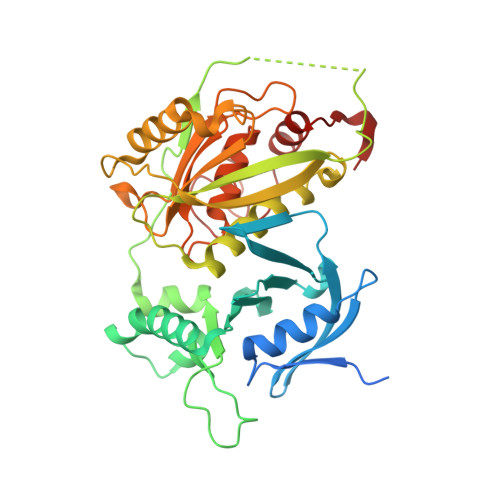Structure, function and latency regulation of a bacterial enterotoxin potentially derived from a mammalian adamalysin/ADAM xenolog.
Goulas, T., Arolas, J.L., Gomis-Ruth, F.X.(2011) Proc Natl Acad Sci U S A 108: 1856-1861
- PubMed: 21233422
- DOI: https://doi.org/10.1073/pnas.1012173108
- Primary Citation of Related Structures:
3P24 - PubMed Abstract:
Enterotoxigenic Bacteroides fragilis is the most frequent disease-causing anaerobe in the intestinal tract of humans and livestock and its specific virulence factor is fragilysin, also known as B. fragilis toxin. This is a 21-kDa zinc-dependent metallopeptidase existing in three closely related isoforms that hydrolyze E-cadherin and contribute to secretory diarrhea, and possibly to inflammatory bowel disease and colorectal cancer. Here we studied the function and zymogenic structure of fragilysin-3 and found that its activity is repressed by a ∼170-residue prodomain, which is the largest hitherto structurally characterized for a metallopeptidase. This prodomain plays a role in both the latency and folding stability of the catalytic domain and it has no significant sequence similarity to any known protein. The prodomain adopts a novel fold and inhibits the protease domain via an aspartate-switch mechanism. The catalytic fragilysin-3 moiety is active against several protein substrates and its structure reveals a new family prototype within the metzincin clan of metallopeptidases. It shows high structural similarity despite negligible sequence identity to adamalysins/ADAMs, which have only been described in eukaryotes. Because no similar protein has been found outside enterotoxigenic B. fragilis, our findings support that fragilysins derived from a mammalian adamalysin/ADAM xenolog that was co-opted by B. fragilis through a rare case of horizontal gene transfer from a eukaryotic cell to a bacterial cell. Subsequently, this co-opted peptidase was provided with a unique chaperone and latency maintainer in the time course of evolution to render a robust and dedicated toxin to compromise the intestinal epithelium of mammalian hosts.
Organizational Affiliation:
Proteolysis Lab, Department of Structural Biology, Molecular Biology Institute of Barcelona, Consejo Superior de Investigaciones Científicas, Barcelona Science Park, Helix Building, E-08028 Barcelona, Spain.


















